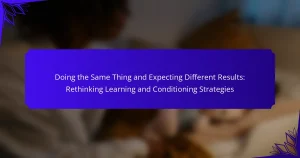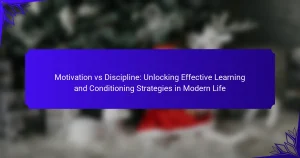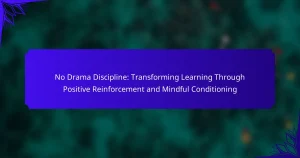Mastering learning and conditioning is essential for success in today’s digital age. This article explores effective learning strategies, the importance of adaptability and engagement, and unique approaches like personalized learning and gamification. It also highlights how to integrate these principles into daily routines for improved focus and productivity. By emphasizing these skills, individuals can enhance their resilience and thrive in competitive environments.
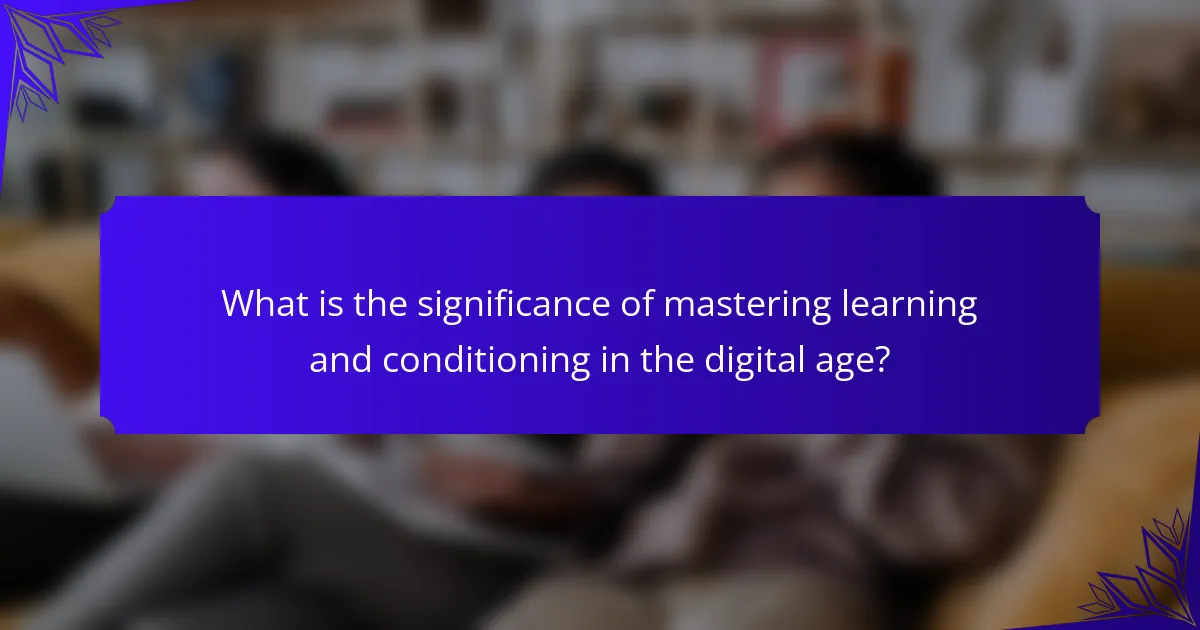
What is the significance of mastering learning and conditioning in the digital age?
Mastering learning and conditioning is crucial in the digital age for personal and professional success. It enhances adaptability, enabling individuals to thrive in rapidly changing environments. Effective learning strategies foster critical thinking, creativity, and problem-solving skills, which are essential for navigating digital landscapes. Additionally, conditioning techniques improve focus and productivity, helping individuals manage distractions inherent in digital platforms. Emphasizing these skills leads to greater resilience and innovation, positioning individuals advantageously in competitive markets.
How has technology transformed traditional learning methods?
Technology has significantly transformed traditional learning methods by integrating digital tools that enhance accessibility and engagement. Online platforms facilitate personalized learning experiences, allowing students to progress at their own pace. Additionally, multimedia resources, such as videos and interactive simulations, cater to diverse learning styles, promoting better retention of information. The use of data analytics in education enables educators to identify learning gaps and tailor instruction accordingly. As a result, technology fosters a more inclusive and effective learning environment that prepares students for success in the digital age.
What are the key principles of learning and conditioning?
The key principles of learning and conditioning focus on behavior modification through reinforcement and association. These principles include classical conditioning, where a neutral stimulus becomes associated with a meaningful stimulus, and operant conditioning, which involves rewards or punishments to shape behavior. Understanding these principles enhances educational strategies and personal development in the digital age.
What are the foundational theories behind learning and conditioning?
Foundational theories behind learning and conditioning include behaviorism, cognitive theory, and constructivism. Behaviorism emphasizes observable behaviors and the effects of external stimuli. Cognitive theory focuses on internal mental processes and how they influence learning. Constructivism posits that learners construct knowledge through experiences. Each theory offers unique insights into effective learning strategies in today’s digital age.
How do reinforcement and punishment influence behavior?
Reinforcement increases desired behaviors while punishment decreases unwanted behaviors. Both are essential in shaping behavior effectively. Positive reinforcement encourages repetition of actions by providing rewards, enhancing motivation. Conversely, punishment, whether positive or negative, aims to deter specific behaviors by introducing adverse consequences or removing favorable conditions. Understanding these mechanisms can optimize learning and behavior modification in various contexts, especially in digital environments.

What universal attributes define successful learning strategies?
Successful learning strategies are defined by adaptability, engagement, self-regulation, and feedback. These attributes ensure learners can navigate the complexities of digital education effectively.
Adaptability allows learners to adjust their methods based on new information or changing circumstances. Engagement fosters a deeper connection with the material, enhancing retention and understanding. Self-regulation enables learners to set goals and monitor their progress, which is crucial in a self-directed environment. Feedback provides essential insights into performance, guiding improvements and reinforcing learning outcomes.
In today’s digital age, these universal attributes create a framework for effective learning, accommodating diverse needs and promoting success.
What role does adaptability play in contemporary learning environments?
Adaptability is essential in contemporary learning environments, enabling learners to thrive amid rapid changes. It fosters resilience, encouraging students to embrace new technologies and methodologies. Adaptable learners can adjust their strategies based on feedback, enhancing their problem-solving skills and creativity. This flexibility is crucial for success in today’s digital age, where information and tools evolve continuously.
How important is motivation in the learning process?
Motivation is crucial in the learning process as it drives engagement and persistence. When learners are motivated, they are more likely to set goals, seek knowledge, and overcome challenges. Research indicates that intrinsic motivation enhances understanding and retention, leading to better performance. In today’s digital age, where distractions abound, maintaining motivation is essential for success in mastering learning and conditioning.
What are the benefits of self-directed learning?
Self-directed learning enhances personal growth, fosters autonomy, and develops critical thinking skills. It encourages individuals to take charge of their education, leading to improved motivation and retention. This approach allows for tailored learning experiences that align with personal interests and goals, resulting in deeper engagement. Additionally, self-directed learners often acquire problem-solving abilities that are essential in today’s digital age.
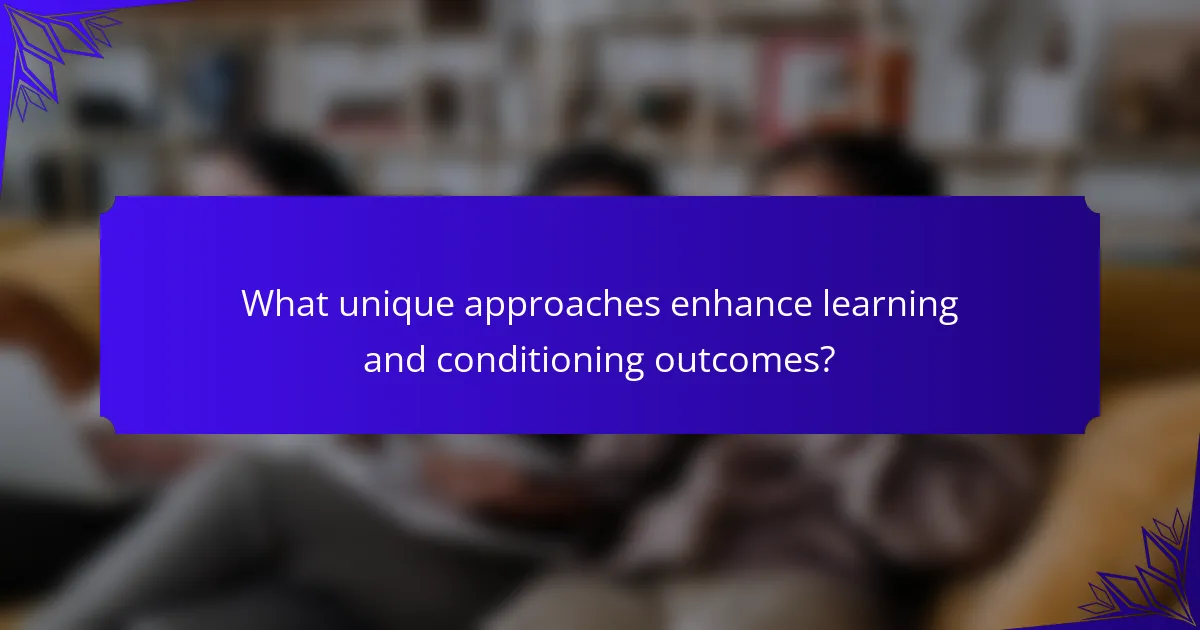
What unique approaches enhance learning and conditioning outcomes?
Unique approaches that enhance learning and conditioning outcomes include personalized learning experiences, gamification techniques, and adaptive learning technologies. These methods cater to individual needs, making learning more engaging and effective. Personalized learning tailors content to the learner’s pace and style, improving retention rates. Gamification boosts motivation through rewards and challenges, promoting active participation. Adaptive learning technologies utilize data to adjust educational content in real-time, ensuring optimal learning pathways.
How can gamification improve engagement in learning?
Gamification significantly enhances engagement in learning by incorporating game-like elements that motivate learners. This approach fosters a sense of achievement through rewards, challenges, and progress tracking.
Gamification leverages unique attributes such as instant feedback and competition, which can lead to increased participation and retention. For example, incorporating leaderboards and badges can create a competitive atmosphere that drives learners to excel.
As a result, learners often experience improved focus and commitment, translating to better educational outcomes. Studies indicate that gamified learning environments can boost motivation by up to 60%, demonstrating the effectiveness of this strategy.
In summary, gamification transforms traditional learning into an interactive experience, making it more enjoyable and effective for today’s digital learners.
What innovative tools are shaping modern educational practices?
Innovative tools such as adaptive learning platforms, virtual reality, and AI-driven analytics are transforming modern educational practices. These tools enhance personalized learning experiences, improve engagement, and provide data-driven insights for educators. Adaptive learning platforms adjust content based on individual student performance, ensuring tailored educational pathways. Virtual reality creates immersive learning environments, allowing students to explore complex concepts interactively. AI-driven analytics offer unique insights into student progress and learning patterns, enabling timely interventions. Together, these tools exemplify the shift towards a more dynamic and responsive educational landscape.
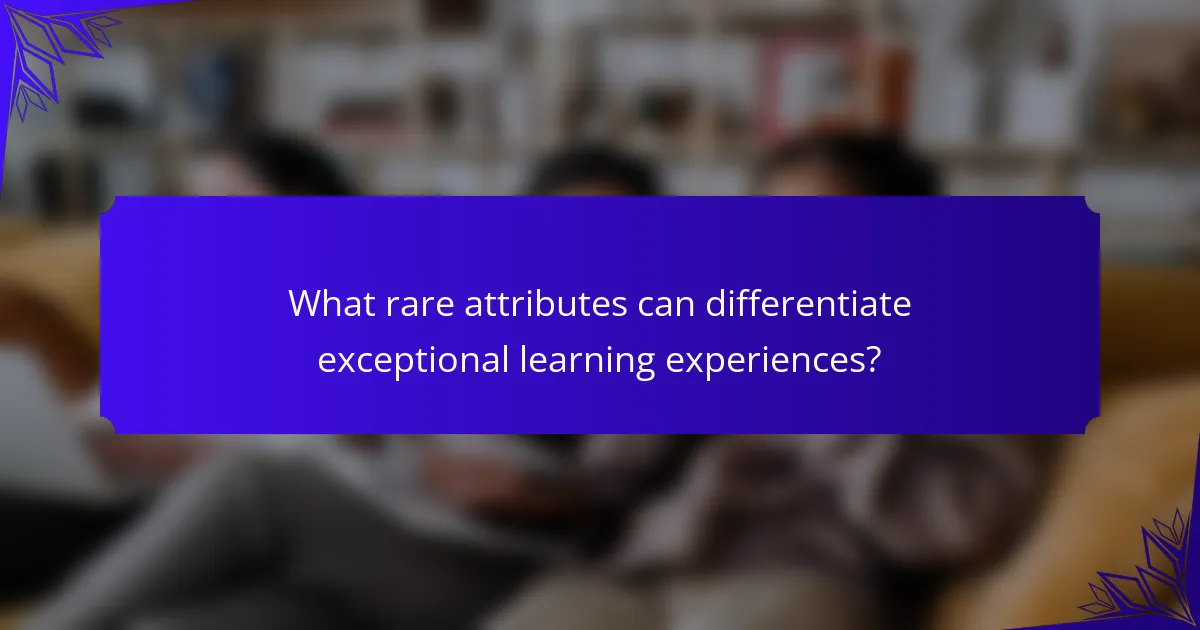
What rare attributes can differentiate exceptional learning experiences?
Exceptional learning experiences can be differentiated by unique attributes such as personalization, adaptability, and interactivity. Personalization allows for tailored content that meets individual learner needs. Adaptability ensures that learning paths evolve based on progress and feedback. Interactivity engages learners through active participation, enhancing retention and motivation. These rare attributes create a more impactful and memorable educational journey.
How do emotional intelligence and social learning impact conditioning?
Emotional intelligence and social learning significantly enhance conditioning by fostering adaptive behaviors and improving interpersonal interactions. Emotional intelligence allows individuals to recognize and manage their emotions, leading to better responses in social contexts. Social learning encourages observation and imitation, facilitating the acquisition of new skills and behaviors. Together, these factors create a more conducive environment for effective learning and conditioning in the digital age.
What is the significance of experiential learning in skill acquisition?
Experiential learning is crucial for skill acquisition as it promotes active engagement and real-world application. This approach enhances retention and understanding, making learning more effective. By participating in hands-on experiences, learners develop critical thinking and problem-solving abilities. Additionally, experiential learning fosters adaptability, essential in today’s digital age. Through reflection on these experiences, individuals can refine their skills and approach, leading to continuous improvement and mastery.
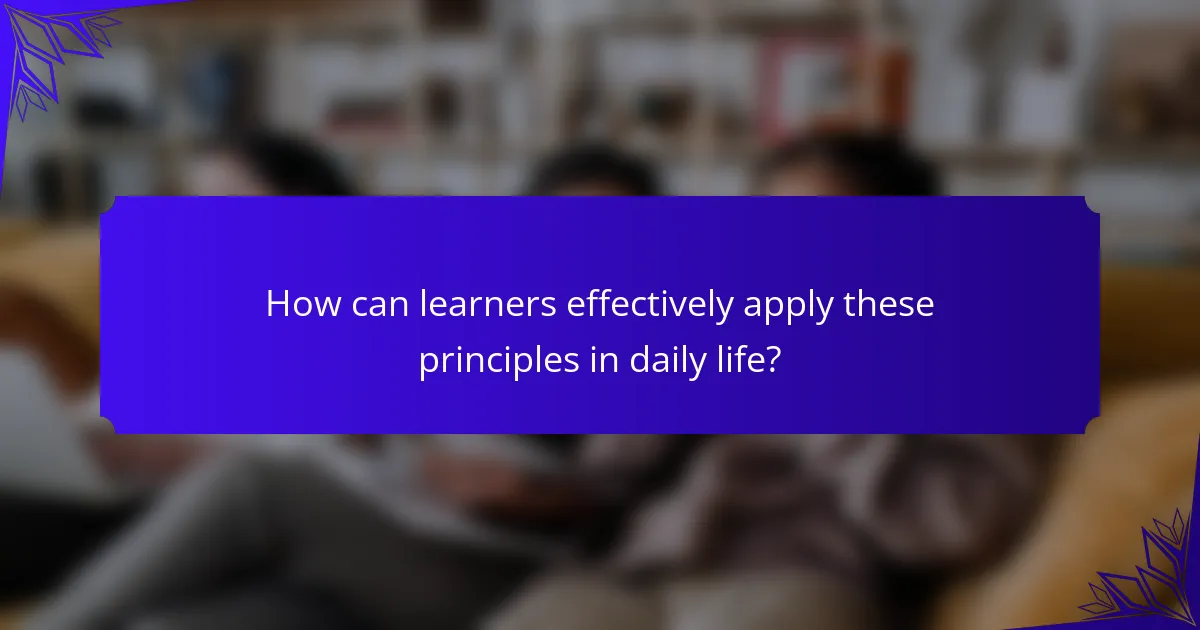
How can learners effectively apply these principles in daily life?
Learners can effectively apply these principles by integrating them into their daily routines. Start with setting clear goals to guide learning efforts. Utilize digital tools for structured learning and self-assessment. Engage in active practice to reinforce concepts and enhance retention. Collaborate with peers to share insights and deepen understanding. Regularly reflect on progress to adjust strategies as needed.
What strategies can optimize learning retention?
Active learning techniques enhance retention by engaging learners. Strategies include spaced repetition, retrieval practice, and elaborative interrogation. Spaced repetition involves reviewing material over increasing intervals, which strengthens memory. Retrieval practice focuses on recalling information, reinforcing neural pathways. Elaborative interrogation encourages learners to ask “why,” deepening understanding and connection to existing knowledge. These methods collectively improve long-term retention and mastery of content.
What common mistakes should be avoided in the learning process?
To enhance the learning process, avoid common mistakes such as procrastination, lack of goal-setting, and ineffective study methods. Procrastination delays progress, while unclear goals lead to aimless learning. Ineffective study methods, such as passive reading, fail to engage the mind, reducing retention. Emphasizing active learning strategies can significantly improve outcomes.
What expert insights can enhance learning and conditioning practices?
Expert insights can significantly enhance learning and conditioning practices by integrating technology and personalized approaches. Utilizing data analytics, educators can tailor learning experiences to individual needs, improving engagement and retention. Implementing spaced repetition techniques optimizes memory retention by revisiting material at strategic intervals. Incorporating gamification elements fosters motivation and encourages active participation, making learning enjoyable. Additionally, fostering a growth mindset empowers learners to embrace challenges, enhancing their resilience and adaptability in a digital environment.
